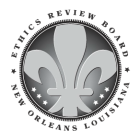At its February 29, 2016 Board meeting, the ERB announced a review of the substantive provisions of the City of New Orleans Ethics Code, the enforcement of the Code, and the Board’s rules, regulations, and administrative procedures. Section 1303 of the ERB’s rules mandate this review at least every five years to assure that the rules “promote integrity, public confidence, and participation in city government,” and to assess “whether they set forth clear and enforceable, common-sense standards of conduct.” See ERB Rules § 1303 (“Review of Board Rules”).
The Board’s review included reconsideration of the manner in which ethics complaints are investigated, prosecuted, and adjudicated. Under the current administrative framework, the Board investigates, prosecutes, and adjudicates complaints. See Rules for the Ethics Review Board §§ 601-815 (Feb. 1, 2011). For example, the Board, through its General Counsel, “may investigate any matter by gathering evidence.” Id. § 601. The Board then “shall decide whether . . . charges should be filed and the case noticed for public hearing.” Id. § 603. If the Board so decides, “[a] public hearing is initiated by order of the Board through the issuance of charges,” and a “time and place” is fixed for a public hearing. Id. § 802. At that hearing, the Board’s General Counsel or other trial counsel “for the board” acts as prosecutor. Id. § 805(A). The Board, without the assistance of counsel, then deliberates and decides whether the charges it ordered to be filed were meritorious. Id. § 805(F).
This procedural framework, however, may violate due process and fundamental fairness. In Allen v. La. State Bd. of Dentistry, 543 So. 2d 908, 915-16 (La. 1989), the Louisiana Supreme Court held that “the commingling of prosecutorial and adjudicative functions violates both the letter of the Louisiana Administrative Procedure Act and the due process goals it is designed to further. . . . The idea of the same person serving as judge and prosecutor is anathema under our notions of due process. Such a scenario is devoid of the appearance of fairness.” See also Ga. Gulf Corp. v. Bd. of Ethics for Pub. Employees, 694 So. 2d 173, 178 (La. 1997) (discussing lack of “appearance of fairness” associated with the “failure to clearly delineate and differentiate the functions of the prosecutor and adjudicator”); Haygood v. La. State Bd. of Dentistry, 101 So. 3d 90, 97-98 (La. Ct. App. 4th Cir. 2012) (finding that Board of Dentistry “improperly combined the prosecutorial and judicial functions by allowing its general counsel . . . to serve as the prosecutor, general counsel, panel member and adjudicator for the proceedings” in violation of respondent’s “due process right to a neutral adjudicator and a fair hearing”). As recently as June 9, 2016, the United States Supreme Court observed that “an unconstitutional potential for bias exists when the same person serves as both accuser and adjudicator in a case.” See Williams v. Pennsylvania, No. 15-5040 at 6 (Jun. 9, 2016); In re Murchison, 349 U.S. 133 (1955) (holding that judge’s dual position as accuser and decisionmaker in trial violated due process).
Because the current framework commingles the prosecutorial and adjudicative functions within the Ethics Review Board, the Board will consider amending its rules to bifurcate those functions. The proposed amendments are here (PDF downloads):
2016-11-09 Draft Ordinance for OIG Ethics Enforcement
2016-11-18 Draft ERB Rules for OIG Ethics Enforcement
If adopted, these revisions would place the investigative and prosecutorial function in the Office of the Inspector General (“OIG”). Even though the OIG does have some relationship and oversight by the Board, this relationship would not impede bifurcation. Indeed, the Louisiana Supreme Court has approved a similar system used by the Louisiana Attorney Disciplinary Board to comply with Allen. Under that system: “While the disciplinary board performs both an adjudicative and prosecutorial function, these functions are separated within the board. Supreme Court Rule XIX, § 2(A). The rule clearly delineates the functions of the disciplinary board and the disciplinary counsel, avoiding the commingling of functions in a single person which we found objectionable in Allen.” In re Laudumiey, 849 So. 2d 515, 523-24 (La. 2003). The court has likewise approved a similar system used by the Louisiana Judiciary Commission, which allocates the prosecutorial function to the Office of Special Counsel. See, e.g., In re McInnis, 769 So. 2d 1186, 1194 (La. 2000); In re Johnson, 683 So. 2d 1198, 1202 (La. 1996).

